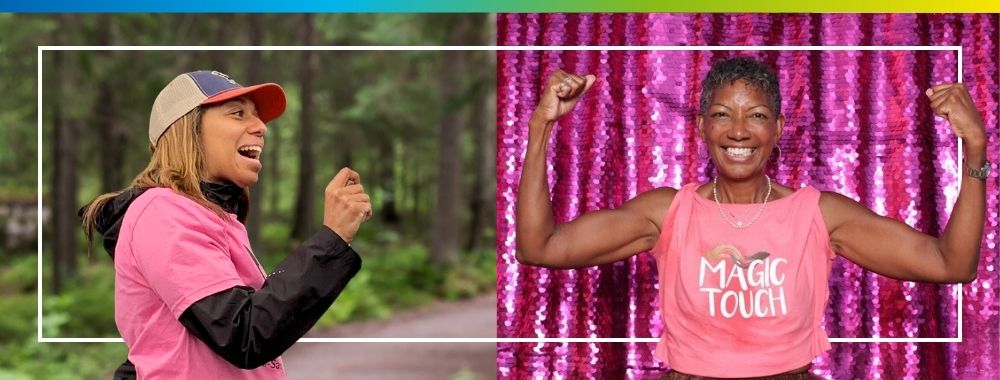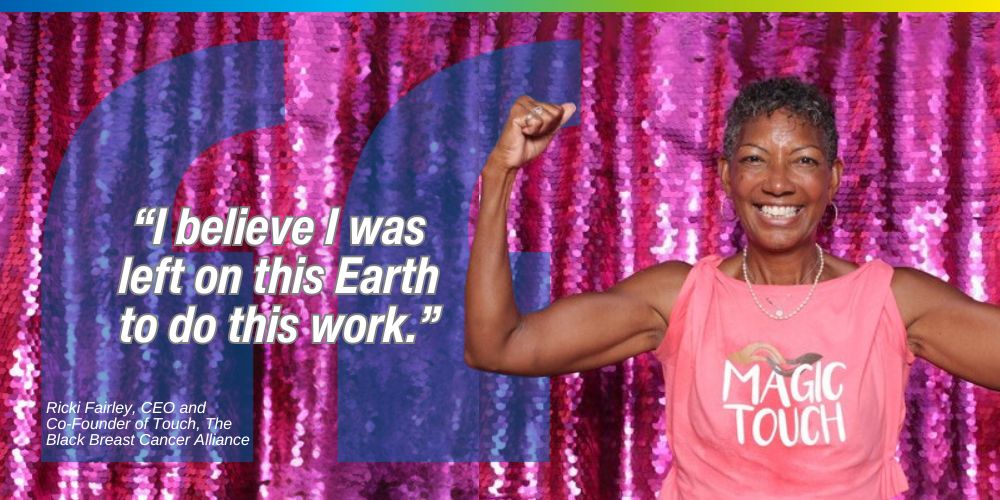
Fay Dunbar, our Director of Inclusion & Diversity, sat down with Ricki Fairley to discuss an important topic—advocating for Black women living with breast cancer. While Fay and Ricki—the CEO and Co-Founder of Touch, The Black Breast Cancer Alliance—had never met, they forged an instant connection, bonding over closing the gap in cancer care. Read on for inspiring excerpts from their conversation.
Fay: Ricki, tell us about your story and what inspired you to become an advocate.
Ricki: I was diagnosed with triple negative breast cancer (TNBC) in 2011. After I had a double mastectomy and went through six rounds of chemotherapy and six weeks of radiation, I was told I had no evidence of disease and to come back in two months to get a scan.
My next scan revealed five spots on my chest wall. My doctor told me to get my affairs in order and said I had about two years to live. But I could not die—I had too much to live for. My family needed me. Through my research I came across the TNBC Foundation, and the Co-Founder connected me with one of the few doctors in the country who was doing research on TNBC at the time. More than a decade later, I am still alive.
My mission became to find out why Black women have such a hard time with breast cancer. I believe I was left on this Earth to do this work.
 Ricki Fairley, CEO and Co-Founder of Touch, The Black Breast Cancer Alliance
Ricki Fairley, CEO and Co-Founder of Touch, The Black Breast Cancer Alliance
Fay: How is breast cancer for Black women different?
Ricki: Black women get TNBC at three times the rate of White women.1 We have both an overall 41% higher mortality rate and a 39% higher recurrence rate than White women.1,2 Black women under the age of 35 are also twice as likely to be diagnosed with breast cancer.1
These statistics have always been unacceptable to me! What’s going on? One thing I learned is Black women are not enrolling in clinical trials. This can cause us to miss out on emerging and often life-extending treatments that aren’t otherwise available—and also miss out on the chance to contribute to the science that can show whether these medicines will ultimately work for us. It made me wonder: what was stopping them from enrolling?
Fay: It seems that the more answers you got, the more questions you had.
Ricki: It’s true. We needed to keep asking and digging for answers. My marketing background told me we needed to go straight to the source, so Touch conducted research to understand why Black women were not enrolling in clinical trials. We talked to 300 Black “breasties”—what we affectionately call women living with breast cancer—spanning all ages, stages and subtypes. We learned there’s a fear of the unknown, and that we could convince a Black breastie to do a trial by saying a simple thing like, “You know that pain medicine you took last week? It was in a clinical trial.” We started #BlackDataMatters to put the need to do cancer research with Black women in the forefront.
Fay: How are you using what you have learned to support Black women living with cancer?
Ricki: We launched When We Tri(al), a platform for breasties to hear from voices they trust and share their experiences with clinical trials. We’ve held 60 events and counting all over the country. We go to where Black women live, work, play, pray and slay. We talk to strangers, and we try to do it in iconic ways—from wearing tutus on the beach, to having a street party with a DJ. We start conversations about knowing your history, knowing your body, advocating for yourself. We break down the benefits of clinical trials in ways everyone can understand. As a result, we’ve signed up almost 15,000 women for clinical trial portals in the last year.
Fay: What you’ve accomplished in such a short time is phenomenal. We think about building diversity in clinical trials in a similar way at Daiichi Sankyo—it has to be a collective effort to bridge the education gap for patients. We try very hard to be part of the solution and work together with the community, with the healthcare system, and with patients.
Ricki: We’re so grateful for the support you give us and can’t thank you enough for being in our corner, listening to us and giving us a voice. We encourage everyone to spread the word, and there is a lot more we can do together: things like simplifying materials so they are easier to understand and connect with our audiences.
Fay: You’ve touched on some very important things—like trust, collaboration and simplicity—that can help motivate Black women to enroll in clinical trials. What else do you think could help close the gaps?
Ricki: Reminding women what matters most to them can be a powerful tool. It’s about love. It’s about families. It’s about seeing another birthday. I never would have been able to meet my three young granddaughters if I hadn’t found a trial. We want to give all Black women that same gift of clarity, and the chance for more time.
To learn more about Touch and its programs, click here.
1. Touch The Black Breast Cancer Alliance. Black Breast Cancer: The Facts. Accessed December 2023
2. American Cancer Society. Cancer Facts & Figures for African American/Black People. Accessed December 2023.
Suggestions
The role of Medical Affairs is to bridge the gap between scientific research and real-world medical practice. After 17 years, I’ve seen firsthand ...
Hearing the words “you have cancer” for the first time was shocking. After 8 years of remission, our work has never felt more personal than when I heard them again...
When I reflect on what makes Daiichi Sankyo special, I always come back to our culture. It’s not just a set of corporate values tucked away in an employee handbook. It’s something we live and breathe every day…